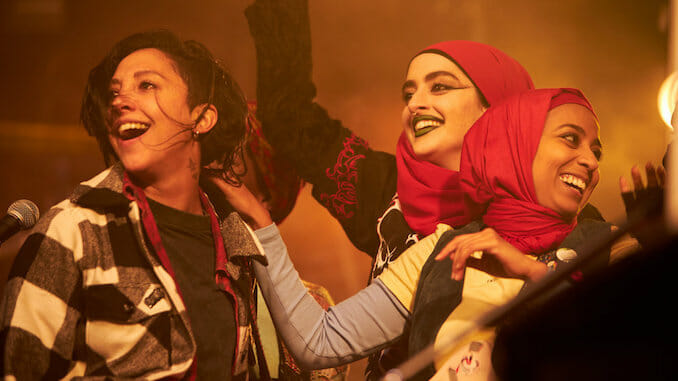How Peacock’s Raucous We Are Lady Parts Fights for Girls’ Rights to Failure
Photo Courtesy of Peacock
“Own your freakiness, before it owns you.” So rings the declaration of Muslim mother, fierce bassist, and indomitably sweet spirit Bisma (Faith Omole). While she serves it as a piece of encouragement to the perpetually nervous, stage fright-ridden, but dorkily charismatic Amina (Anjana Vasan), it could easily translate to a subheading for Peacock’s new raucous musical comedy series, We Are Lady Parts.
Documenting the accidental (but transformational) addition of the sometimes hapless, staunchly buttoned-up microbiology PhD student Amina to an all-woman, devoutly Muslim British punk band that takes delight in shredding the ears of its disapproving audiences, creator Nida Manzoor’s series revels in the same tone of cathartic outrage as its titular band’s riot grrl, punk, and heavy metal idols. With instantly lovable characters who practically batche in anxiety around their interpersonal relationships, played by a cast of delightfully excitable performers who thrive in the series’ melodramatic, stylized interludes, the show’s first season is a combination of loud joy, anger, and terror that is especially well-suited for an audience facing the challenges of coming into their own, or coming out themselves.
From the very first episode, loud creative expression isn’t just relegated to original anthems and cheeky covers that spell out the band mates’ frustrations with bad dates (“Bashir with the Good Beard”) and bigoted strangers (“Voldemort Under My Headscarf”). It fuels Amina’s expansively cinematic, horny fantasies of encounters with her future husband. It thrives in the spoken word of lead singer and rhythmic guitarist Saira (Sarah Kameela Impey), who uses performance as one of the only ways to communicate what she really wants, even to herself. It literally drowns out the complaints of impassive drummer Ayesha’s (Juliette Motamed) obnoxious rideshare customers, and it splatters the pages of Bisma’s home-cooked graphic novel about women who gain murderous supernatural abilities from the power of their menstrual cycles. The band members have a wealth of information and ideas in their brains, and rather than focusing solely on music as a way of funneling it toward solving all their problems, Manzoor—who also wrote and directed each episode—allows her characters to take their time battling the onslaught of anxieties and microaggressions that pepper a less-than-satisfactory “Just a Girl” existence.
Perhaps the most intriguing relationship of the show thus far (and its scant six episodes are just itching for a second exclamatory season) comes from its two most polar opposite characters, both who try to unsuccessfully bury their dissatisfaction in their own unshakeable images of who they should be. While the heavily tattooed, undercut-adorned Saira is a classic rebel-with-a-cause expelled from school, and informally excommunicated by her traditional, appearances-ruled family, Amina forms her own rebellion against her much more lax, confused, and warmly endearing parents by determinedly wanting to “settle” for a more conservative husband and eventual father—even one who considers her playing music, her doctorate, or any other slight aspect of her personality to be too individualistic. Against all odds, Saira takes the most interest in Amina, sensing her “freak” nature under the tightly-wrapped denial, and painstakingly coaching her through songs and spoken word alike to help her manage her incapacitating anxiety.